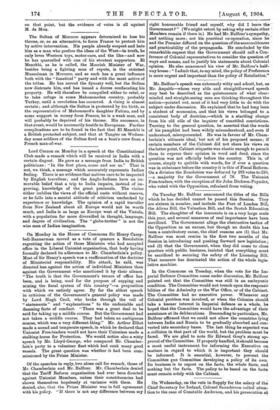Mr. Balfour's speech was extremely witty and adroit, but, as
Mr. Asquith—whose very able and straightforward speech may best be described as the quintessence of what clear- minded and straight-seeing men are thinking throughout the nation—pointed out, most of it had very little to do with the subject under discussion. He explained that be had long been a student of economics, and that his views belonged to a consistent body of doctrine,—which is a startling change from his old role of the inquirer of unsettled convictions. Turning to the general question, he asserted that the words of his pamphlet had been widely misunderstood, and even if understood, misrepresented. He was in favour of Mr. Cham- berlain's ultimate ideal, but not of his proposed means ; if certain members of the Cabinet did not share his views on the latter point, Cabinet etiquette was elastic enough to permit them to express their opinion in word and deed, since the question was not officially before the country. This is, of course, simply to quibble with words, for if ever a question was in substance before the country it is this of Fiscal Reform: On a division the Resolution was defeated by 288 votes to 210, —a majority for the Government of 78. The Unionist Free-traders, with the exception of Sir John Dickson-Poynder, who voted with the Opposition, refrained from voting.






































 Previous page
Previous page